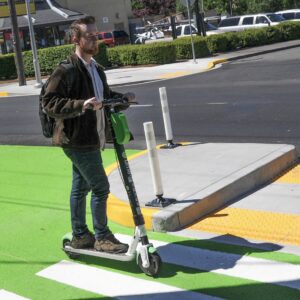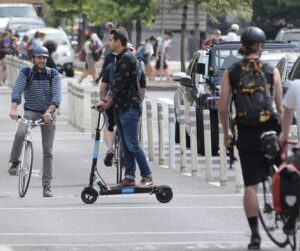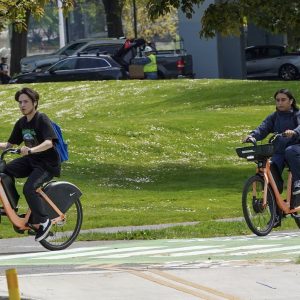
The City of Portland has silently launched a new fleet of electric scooters. As far as I can tell, the new scooters hit the streets this week. A spokesperson I contacted via text yesterday after seeing the scooters in the wild for the first time responded with only, “Soft launch. Big news coming. In a couple weeks. 😃 [smiling face emoji].”
The scooters are Biketown-branded and are owned by Lyft, the same company that holds Portland’s bike share contract. Readers have reported Biketown stations full of scooters in northwest and the Lloyd. The tight marketing integration (you can also find the scooters in the same Biketown app where you rent bikes) makes sense and will likely help these new scooters succeed.
PBOT first launched an e-scooter rental program in July 2018. Despite being a mode many people love to hate, e-scooters have done very well here. In 2022 PBOT decided it was time to drop the “pilot” and make scooters a permanent program. Since that time they’ve issued requests for proposals for a company (or companies) to operate the program and expected to have the new contract in place last year.

We’ve had several different scooter companies enter and exit our market. Bird was here for a while. So was Spin, but both of those companies no longer offer e-scooters in Portland. That leaves just Lime — and now Lyft/Biketown — as the only scooters on our streets. According to the city’s micromobility dashboard, there are currently about 1,340 e-scooters for rent in Portland (compared to about 1,000 e-bikes).
A page on the Biketown website shares a bit more about the scooters:
- the first ride is limited to 10 mph maximum, then they top out at 15 mph (we should do that for cars!);
- riders must be 18 or over;
- parking is free at Biketown stations and there’s a $1 fee if parked elsewhere;
- the scooters have integrated turn signals;
- riding is prohibited inside Portland parks, high school campuses, and TriMet MAX platforms.
Pricing-wise, annual Biketown members can unlock scooters for free and rides are $0.27 per minute. Non-member rates are $1 to unlock and $0.37 per minute. The “Community Pass” offers eligible Portlanders a monthly fee of $5 for free unlocks and rides for $0.07 per minute.
The scooter is Lyft’s “next-gen” model that came out in February 2023. It’s got lots of tech to track routes and detect when riders are on sidewalks. The scooters also have a phone mount, dual brake leavers, and suspension.
PBOT spokesperson Dylan Rivera says Lime and Lyft are slowly ramping up service and, “In the coming weeks the two companies should have more than 3,000 scooters combined in Portland.”
Stay tuned for the official launch and let us know if you’ve ridden one yet and what your experience has been.







Thanks for reading.
BikePortland has served this community with independent community journalism since 2005. We rely on subscriptions from readers like you to survive. Your financial support is vital in keeping this valuable resource alive and well.
Please subscribe today to strengthen and expand our work.
This is great news. Scooters are great option for many people, and serve large areas of the city that have been (and probably always will be) neglected by Biketown. Moreover, compared to similar cities (and scaling to population), the data suggests that Portland could be doing a lot more of these low-impact trips simply by allowing an enlarged scooter fleet. For example, Portland’s fleet is roughly a quarter of the size of Austin or Atlanta’s. Portland’s fleet works harder (doing 2.65 trips per vehicles per day vs Austin’s 1.32), but Austin is still more than doubling our overall trip count. Atlanta’s numbers are similar.
This is awesome IMO, a lot of people like to use scooters and even though they’re not bikes, at least they’re not cars!
I still think the fee to unlock is ridiculous. I’m fine if you charge me a higher rate for not being a member, but $1 doubles my cost for a 3 minute ride!
Are people using these for rides less than even 5 minutes? I suspect the average ride duration is much longer (though that’s purely a gut feeling)
Shared mobility is often thought of as a “last mile” option in planning circles. At 10mph, this implies a 6 min ride. Even if scooters are used for lost of other purposes, the unlock fee does impose a pretty substantial penalty for what is supposed to be one of the key benefits of these kind of systems: making it easier to get to and from rail stations.
@ .37c per minute, plus a $1 unlock fee gives you $5.40 assuming you screw around for 1 minute on either end locking/unlocking, that you don’t encounter any long stop lights or other delays, and that you return it to a station, which might not be at your actual destination. More money if you need to hunt around for a station in a futile effort to save the $1 fee for parking it an a random location.
This is more than a full day of riding TriMet, and if your destination is not near a locking station, you’ve got to figure out how to get back to your bus stop on your return trip (for another $5.40 plus if you can even find a scooter).
Of course, if you do it every day, it would make sense to join for cheaper rates, but it would still add up pretty quickly.
People are obviously riding them (though I doubt in lieu of driving), but this doesn’t feel like a “last mile” solution for most folks, even during nice weather. I would just walk. And for people who would have trouble walking that mile, they probably aren’t going to take a scooter anyway — these are very much for the young and able.
I like the concept of shared bikes and scooters but have yet to see an implementation that makes sense.
You’d think shared resources would be more efficient and get more use than privately owned ones, but shared bikes and scooters cost way more than owning decent stuff and get less use.
I’ve never gotten the “last mile” appeal. Even for free, I can’t be bothered to take one of my bikes for a distance like that, let alone blow my beer budget.
There’s a lot of overhead involved with shared resources. If I own my bike, I’ll take care of it, both in the sense that I’ll be gentle with it, but also in the sense that my labor is “free” and I’m likely to attend to maintenance at least occasionally.
When you have a shared resource, you have to pay someone to take care of it (which gets expensive when you have an electric vehicle that needs regular tending), and some people are going to abuse it. You need support trucks that themselves need fuel and tending. You need people hauling bikes from place to place to rebalance the system. If you don’t want parts to get stolen, you need to use irregular everything, which drives up maintenance costs. You need to train you mechanics on the special systems you use but are found nowhere else, both your custom mechanicals but also keypads, location trackers, and locking mechanisms. You need to maintain an app and deal with payments and all the things that can go wrong in that universe, and have staff to address payment issues and other weird things that arise when code and money are involved.
And, it strikes me, the lower the cost of the shared resource, the more magnified this overhead will appear ($500/year per vehicle is one thing if it’s a car, and quite another if it’s a scooter). Also, if the vehicles are cheap enough, it may be more “efficient” to dispose of a faulty unit rather than fix it, so a shared system might end up discarding more slightly faulty vehicles than if they were privately owned.
When I own my own bike or scooter, I can just ride it when I want, and dispense with all that costly overhead. Which is exactly what I do.
I did 3 trips on Biketown yesterday. Most of the bikes at each corral were flagged for maintenance. Two of the bikes I rented were barely rideable (one had a stuck rear brake, the other had a dented rim). And good lord, most of them were filthy. Graffiti, dirt / dust, bird poop, even baskets full of garbage. Half the bikes I saw didn’t show up as available in the Lyft app.
And then the price… I rode probably a total of 10 miles and spent about $20. Hard to justify.
The only reason I keep riding is that I know my own bike will be stolen or stripped if I attend a movie or live music event for a couple hours. I guess the rideshare companies are making bank, though. Can’t help but feel like Portlanders are getting the short end of the stick once again.
“And good lord, most of them were filthy.”
Be glad we didn’t have the big naked bike ride this year…
Why isn’t there a requirement that both the bikes and the scooters be returned to docks at the end of each ride? Blocked sidewalks, multiuse paths, etc. have become a norm because the for-profit companies that operate these systems do not require customers return bikes and scooters to the places that have been approved for them. Some cities do have such requirements. It’s blissful in those places. I HAVE SEEN IT WITH MY OWN PEEPERS.
I hear you on the concerns with blocking sidewalks, most scooters I see are parked properly. Those that are not I will move them myself out of the way.
Dockless bikes/scooters are awesome because they are way more practical. In fully docked systems like NYC and LA, you have to find a nearby station which could be many blocks from where you’re trying to go, plus you can get there to find no free docks available for parking your bike. My main quibble is Biketown charges you an extra $1 to do this, but doesn’t credit you back the $1 if you pick up a bike out of station which would actually help bring back more bikes to stations. I miss the old school biketown bounty system, folks used to be able to earn enough credits to keep riding by moving out of station bikes back to the station, now with unlock fees and only temporarily at select stations it’s no longer practical.
Is that right??? Last year when they announced they were adding 500 new bikes that was meant to bring the total number of bikes in the system to 1,500. And even that was bad, because in 2020 when the new system launched we were told there would be 3,000 bikes by 2024.
Honestly, when the current Biketown contract expires the city should reconsider granting a monopoly to Lyft. We no longer have anything like the supposedly public system (albeit privately operated) system that launched in 2016. We might as well allow Lime, the other scooter operator currently in town, to deploy their bikes here so there’s at least some competition.
This is not the kind of thing where competition is helpful. There are many cases like that. There *should* be a monopoly. It was complete nonsense when the scooters originally had 3 or whatever providers, you had to hunt around on different apps to find out who had a scooter, 3 different accounts. So stupid.
This is the kind of thing that a private company will not succeed at. It should be publicly owned, or at the very least have a lot of public control.
Does that also apply to Uber/Lyft? If not, what differentiates them from a regulatory model standpoint?
I think so, it’s worse having two (three if you count legit taxis) than just having one, and besides, they’re exploitative companies that offload responsibilities to their drivers. They’re “good” for consumers because they’re artificially cheap and they have apps. But at the very least, they don’t require actual separate permanent infrastructure. Biketown and scooters have these racks littered around the city that you need to use. There should be one system and you can take your rented bike/scooter from anywhere to anywhere.
Why?
Taxis are a good example of what happens when you have a tightly regulated market. It works well in some ways, but tends to cost a fair bit more and leads to moribund practices (for example, not telling folks the cost of a ride before they’re committed). We used to organize our airlines the same way, and flying was so expensive it was essentially an elite activity. (Of course, you might argue that too many people fly now, incurring high external costs, but that can be addressed by taxing the CO2 emissions so giving the edge to those who are able to reduce them, and it’s unclear we’d be better off with people taking other, higher-emitting modes of transport (probably cars) instead.)
Uber and Lyft were able to succeed because they are more efficient than taxis, and, in many ways better (from the customer’s perspective) while offering essentially the same service. That’s why they’ve been so successful. When given the choice between a taxi and an Uber, many people will avoid the taxi.
Taxis have a lot of fixed infrastructure (dispatch centers, vehicle depots, etc.), that Lyft and Uber did away with. Scooters and bikes don’t need much fixed infrastructure either (the stations are optional). If stations were deemed essential, one could easily design a system where anyone can provide scooters/bikes that use a standard docking system. Since the stations are essentially inert metal racks, that would be quite easy.
I don’t care deeply about scooters (they have no use case for me), but there’s no reason to expect things will be better for users by granting a monopoly.
We’ll just have to agree to disagree. The fact that taxis had problems is all solvable.
Yeah, that was the living wage it paid, before the exploitation of the app companies.
No they didn’t, they just found a loophole to not pay for using the fixed infrastructure of their employees.
They charge you more to park away from a station. And if you have two or three companies, you have fewer places to find a parking spot or you have redundant parking spots. If a standardized system were arranged, that seems like the kind of thing the local government would do, making the separate companies seem even less valuable.
I agree. But it wasn’t being solved.
Too much regulation leads to complacency and regulatory capture. Too little can be problematic as well, but that wasn’t the case with taxis.
Correction: kickbacks, bribery and financial conflicts of interest lead to regulatory capture, not “too much” regulation, whatever that is.
Scooters are so much more dangerous than bikes. I don’t use them because of the risk of serious injury, particularly head trauma. This risk increases exponentially for taller riders. They are not a welcome addition and will displace BIKETOWN bikes at the already limited orange parking racks.
Biketown bike are incredibly expensive to rent and scooters are a badly needed less expensive option. They are a welcome addition and will complement BIKETOWN bikes on mostly empty orange parking racks.
Maybe I’m missing something but I’m not sure the scooters are cheaper. With no membership scooters are 0.37 vs bikes 0.30 a minute. With membership, scooters are 0.27 vs 0.15 for bikes.
The lower rate and free unlocking for Biketown annual members appears to not apply if you have a Biketown For All (low-income) membership. I found that out the hard way.